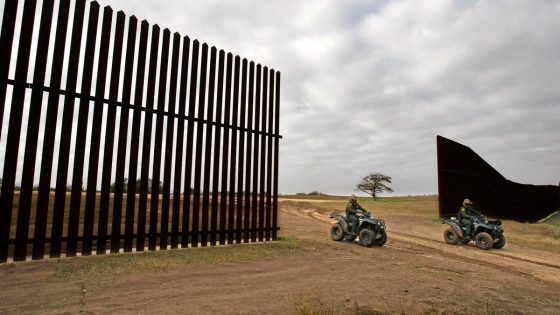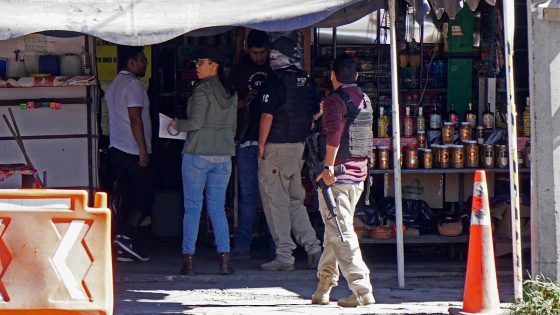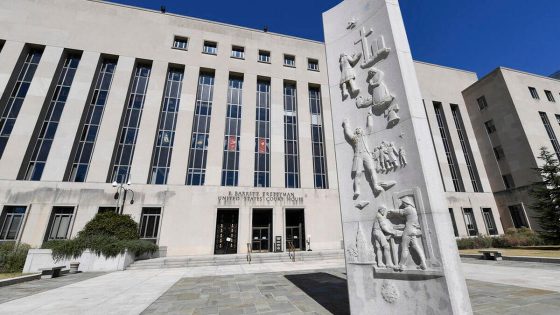Carlos Favian Martinez, the son-in-law of a notorious Mexican drug lord, stepped into a Houston courtroom this week to plead guilty to a labyrinthine scheme that exploited violence and intimidation in the lucrative cross-border used car market. The gravity of the allegations stretched over a disturbing 11-year period, marking a dark chapter in the already embattled region around Los Indios, Texas—just twenty miles northwest of Brownsville.
- Carlos Favian Martinez pleaded guilty to price fixing.
- Martinez is the son-in-law of Osiel Cárdenas Guillén.
- Scheme involved violence and extortion tactics.
- Indictment included nine other participants.
- Martinez faces an 11-year prison sentence.
- Osiel Cárdenas Guillén was recently deported.
Prosecutors laid bare the sordid details of how Martinez and his associates orchestrated a conspiracy that not only manipulated prices but also extorted fellow businesses through threats of physical harm. The U.S.-Mexico border has been plagued by a relentless tide of violence, but the sheer brutality described in court was particularly jarring. Investigators uncovered a pattern of beatings, kidnappings, and even fatal shootings, all aimed at silencing dissent among those who refused to bow to their demands.
“This case highlights the lengths to which these individuals will go to maintain control,” said a federal agent during the proceedings. It all began in 2011, as the indictment revealed, when the conspirators sought to monopolize the forwarding agency services that countless migrants depended on to secure used vehicles before embarking on their long journeys back to Central America. The port of entry in Los Indios has been a vital access point for many desperate for affordable transportation, making it a prime target for exploitation.
Martinez’s connection to the Gulf Cartel’s legacy was unavoidably woven into his story. As the son-in-law of Osiel Cárdenas Guillén—a figure infamous for instigating a brutal wave of cartel violence through the formation of the Zetas—Martinez inherited a dark family legacy. A federal agent alluded to this connection during a July detention hearing, indicating that Martinez referenced his ties across the border during a kidnapping investigation.
As news of his plea permeated Houston, attorneys for Martinez reported that he reached a sentencing deal that anticipates an 11-year prison term. Kent A. Schaffer, his lawyer, noted, “Mr. Martinez has been incarcerated since his arrest over two years ago and sees this resolution as one that will get him back home as soon as possible.” The upcoming sentencing hearing, scheduled for May, will serve as the final chapter in this grim saga.
In another development, Osiel Cárdenas Guillén, the infamous patriarch of this criminal enterprise, was recently deported back to Mexico after serving a portion of his prison sentence in the U.S. His past, marked by unrestrained violence and ruthlessness, has left an indelible mark on the region. Known as “El Mata Amigos” or “Friend Killer,” Cárdenas cultivated a fierce reputation, characterized by tactics that included enlisting former special forces to safeguard his interests.
Authorities have emphasized the significant strides made in combating organized crime through the removal of figures like Cárdenas. “The successful removal of Osiel Cardenas underscores our unwavering commitment to public safety and justice,” said Samuel Olson, a Chicago Field Office Director of Enforcement and Removal Operations. Cárdenas is now facing multiple charges back home, including drug trafficking, organized crime, and money laundering.
The legacy of violence tied to the Gulf Cartel and the Zetas reverberates through the U.S.-Mexico border, raising essential questions about the grip of organized crime in the region and the ongoing battle for supremacy within the underworld. In light of these events, the case against Martinez is just one piece in a larger puzzle, as law enforcement continues to grapple with the complex and brutal realities of cartel influence.
As the situation evolves, community members remain on edge, aware that while justice may be served incrementally, the specter of violence and intimidation continues to loom large over their lives. The anticipation surrounding the upcoming sentencing hearing serves as a reminder that, despite efforts to dismantle these networks, the fight against organized crime is far from over.

































